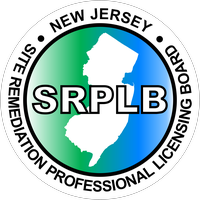LSRP Qualifications and Eligibility Requirement
In order to be eligible to sit for the licensing examination the Board administers, an individual shall submit an application pursuant to N.J.A.C. 7:26I-2.4 that demonstrates or certifies that he or she meets the following qualifications:
- Holds a bachelor's degree or higher in natural, chemical, or physical science or an engineering degree in a discipline related to site remediation from an accredited institution of higher education;
- Has experience amounting to at least eight years of full-time professional experience in the field of site remediation, of which at least five years shall have occurred in New Jersey and at least three years shall have occurred in New Jersey within the five years prior to submission of the application;
- Has a minimum of 5,000 hours of relevant professional experience within New Jersey over the five years immediately prior to submission of the application that is of a professional grade and character that indicates the applicant is competent to issue an RAO;
- Has attended and completed the minimum environmental health and safety education and training pursuant to 29 CFR 1910.120, no more than one year prior to submission of the application;
- Has completed a Board-approved course on the State's rules and regulations concerning the administrative and technical requirements for site remediation no more than 36 months prior to the date of submission of the application
- Has not been convicted of, or pled guilty to, an environmental crime, any similar or related crime under Federal or state law, or any crime involving fraud, breach of trust, theft by deception, forgery, or any crime or offense that would qualify the person for registration pursuant to section 2 of P.L.1994, c.133 (N.J.S.A. 2C:7-2), or any other crime involving moral turpitude, or any similar or related offense under Federal or state law. For the purposes of this section, a conviction or plea of guilty shall include a non vult, nolo contendere, no contest, or finding of guilt by a judge or jury; and
- Has not had a professional license or professional certification revoked by any state licensing board or any other professional licensing agency within the previous 10 years, and has not surrendered a professional license or professional certification in response to a disciplinary investigation within the previous 10 years.
"Full-time professional experience" means experience in which an applicant is required to apply scientific or engineering principles to contaminated site remediation where the resulting conclusions form the basis for reports, studies, or other documents connected with the remediation of a contaminated site. The Board may consider the applicant's work activities, field of practice, duration of employment, and work products prepared in determining the credit to be allowed for professional experience. The Board may allow applicants with relevant advanced degrees up to two years of credit for professional experience, of which one year of credit may be awarded for applicants who have earned a master's degree in a relevant field of study and up to two years of credit may be awarded for applicants who have earned a doctorate degree in a relevant field of study.
"Relevant professional experience" means experience working on New Jersey remediation cases. To prove relevant professional experience, the applicant shall demonstrate that he or she has:
-
Knowledge of and experience with implementing the technical, scientific, and regulatory aspects of site remediation, including experience investigating, designing,
implementing, and/or managing within each phase of the site remediation process:
- Preliminary Assessment;
- Site Investigation;
- Remedial Investigation; and
- Remedial Action;
- Produced, or participated in producing, workplans and/or reports for each phase of the site remediation process; and
- Knowledge of and experience with meeting the Department's administrative requirements including, but not limited to, requirements pertaining to submittal of forms, regulatory and mandatory timeframes, applicable fees, presumptive remedies, remedial action permits, and public notification.
 OFFICIAL SITE OF THE STATE OF NEW JERSEY
OFFICIAL SITE OF THE STATE OF NEW JERSEY